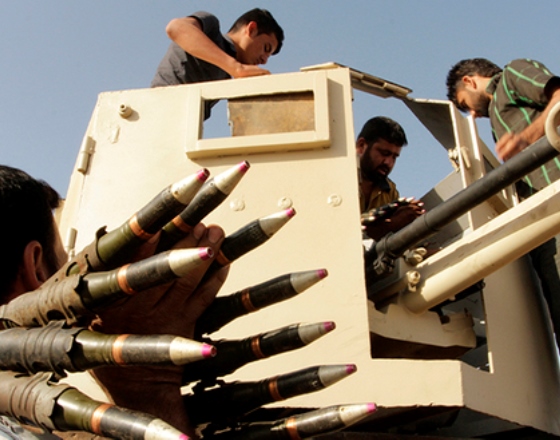
BAGHDAD — The Iraqi Military Industry Commission (MIC) has a tragic story. Iraq developed its local military industry during the Iran-Iraq War, but in 1991, the international coalition — which was established in 1990 by a United Nations decision to force the Iraqi forces out of Kuwait and monitor Iraq’s activities in the military industry field — brought down most of the MIC’s important facilities, and the coalition’s inspection teams destroyed what was left of it under the pretext of destroying weapons of mass destruction.
However, after the end of the Gulf War in February 1991, the regime of late President Saddam Hussein restored some of these facilities and the MIC rebuilt the country’s infrastructure in terms of water, electricity, roads, bridges and military industry. The MIC facilities were once again looted and vandalized by Iraqis following the US occupation in 2003. Hundreds of billions of dollars went down the drain.
Iraq has a relatively long history with the military industry, as the Ministry of Industry and Minerals owns several companies that manufacture guns, rockets and mortar bombs, which still exist today but are no longer operational. To develop these industries, Saddam's regime established the MIC in 1981; it was initially affiliated with the Ministry of Industry and Minerals.
The MIC helped the Iraqi armed forces in securing military gear and supplies during its war with Iran from 1980 to 1988. However, Saddam issued a decree in 1991 transferring the subordination of the MIC from the Ministry of Industry and Minerals to the Ministry of Defense.
The MIC continued its operations despite the devastation it sustained by the war with Iran and the economic blockade imposed by the UN Security Council on Iraq in 1990, until the overthrow of the regime by the United States in April 2003.
Iraq allocated about 23% of its 2015 budget for security forces and armament contracts, aiming to end the expansion of the Islamic State (IS), which seized one-third of the country's surface and executed terrorist attacks in cities controlled by government security forces, such as Mosul and Tikrit.
The policy of attrition adopted by IS of a high human and financial cost to Iraq prompted the Iraqi government to reconsider the local manufacturing of weapons and military equipment, to limit the large sums spent on armament contracts with the United States and Russia.
In early May, the Shiite authority in Najaf realized the importance of military industrialization and called for its reactivation; it urged the Iraqi government to take a swift and bold decision to provide military security for the country.
Nora al-Bejary, a member of the parliamentary Economic and Investment Commission, told Al-Monitor that the Iraqi parliament discussed reactivating the MIC with the minister of industry and minerals in February. Bejary was an MIC employee for 15 years before the fall of Saddam's regime, but she declined to reveal details about her time at the commission.
She said, “The time has come to reactivate the companies affiliated with the MIC in light of the expansion of the open war fronts in a number of areas of Iraq.”
Bejary, who hails from Mosul, confirmed that the reactivation of the MIC will substantially ease the financial burden of the war on Iraq. However, she pointed to the lack of any serious steps by the government in this respect. She added, “There are experienced key employees in the government and ministries capable [of producing] weapons and military equipment that would significantly help Iraq in its war on terrorism.”
For his part, economic adviser to Prime Minister Haider al-Abadi, Mazhar Mohammed Saleh, said that activating the MIC will create major investment potential and secure jobs for competent key Iraqi employees. Saleh told Al-Monitor that the MIC has an important military and economic role in the war on terrorism, but he denied any knowledge of practical steps by the government to reactivate the MIC.
It seems that reactivating the MIC is a political decision, which was confirmed by a former MIC director who supervised the commission's technology efforts. “The government is not serious in taking practical steps,” he told Al-Monitor on condition of anonymity.
He said, “Most of the MIC key employees were affiliated with the Baath Party. They are subject to de-Baathification by the government preventing them from working in government departments.” He added, “Most of the headquarters of military industrial companies are located in the outskirts of Baghdad, such as Yusufiyah. These areas are witnessing critical security conditions and are plagued by terrorism.”
In this regard, Bejary said, “The key employees are available, and it is not true that most of them are subject to the law of de-Baathification.”
The MIC also faces other obstacles. The Ministry of Industry and Minerals stressed in a June 7 statement (of which Al-Monitor obtained a copy) the importance of reviving the military industry in Iraq, but that it is looking for partners from the private sector to proceed with the work.
Complications could arise as the reactivation of military industries in Iraq may also be subject to sectarian quotas in terms of managerial positions within the MIC.
Bejary said that there are further complications, such as obstacles by external and internal parties (which she did not name) that want to keep Iraq weak and dependent on world powers.
Controversial projects between Iraqi political parties require a lengthy debate before a compromise formula can be reached, and the reactivation of the MIC remains one of the most complex undertakings.
original source: http://www.al-monitor.com/pulse/originals/2015/07/iraq-military-industry-war-islamic-state.html#ixzz3eq8GywdG
